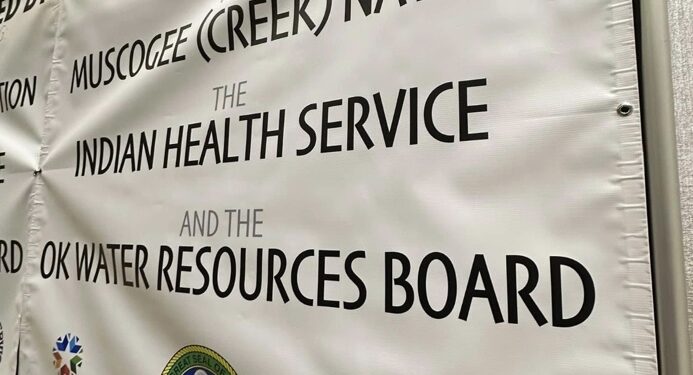TVLSE, Okla. — Representatives from multiple agencies met to sign memorandums of understanding (MOU) in order to authorize ten water projects in several communities across the Nation on Nov. 28 at the River Spirit Casino and Resort.
The joint venture between the Indian Health Service and the Oklahoma Water Resources Board, along with an additional contribution from the Muscogee (Creek) Nation will help fund the projects.
The infrastructure funds are tripled for a total of $20,600,000.
The State of Oklahoma gave the Muscogee (Creek) Nation $6,750,000. The tribe will contribute matching funds. Indian Health Services will donate $3,100,000, an additional $4,000,000 will come from the Oklahoma Water Resource Association, Wagoner and Mayes Counties, and the city of Beggs. All funds will go to water infrastructure for 10 projects in nine communities.
In March the National Council passed TR 23-029, committing a match of $6,750,000 to the American Rescue Plan Act Tribal Grant Cooperation Grant Program.
On Nov. 1 National Council Representative Joseph Hicks introduced National Council Act 23-141 (NCA 23-141) in correspondence with TR 23-029 during a MCN Land, Natural Resources, and Cultural Preservation Committee meeting where the bill passed with four yes votes from the committee.
The bill was addressed in front of the full council at the regular session meeting where it was passed with full support.
Regulations of the program involve making necessary investments to improve access to sanitary drinking water, as well as building vital wastewater support, and stormwater infrastructure. This is a response to the Covid-19 Pandemic and its negative impacts.
The projects include dam repairs, addressing water issues, and improved wastewater management. These projects were selected based on what was in the IHS System. Funding was already available to maximize it.
According to MCN Emergency Management Director Bobby Howard, it was after severe winter storms in February when many problems with water systems arose.
Howard claims many of these projects include restoring systems that were built in the 1970s or around that time.
According to Howard, similar water projects cost millions of dollars. That is something many rural communities could not afford with the tri-collaboration and grant program.
The MCN Emergency Management department has carried water buffaloes across the reservation several times to provide potable water to communities during times of crisis.
“This will benefit everyone, not just Muscogee citizens,” Howard said.
Howard claims that during restoration and construction, communities’ water usage should not be affected.
For more information on how the water projects will affect a specific community or municipality, call MCN Emergency Management at 918-549-2700.





